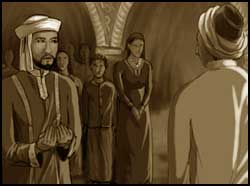
An artist's impression of the conversion of the Sultan of the Maldives to Islam. The sketch shows the Sultan of the Maldives, Sri Tribuvana Aditiya embracing Islam. On the right hand side of the picture is Abulbarakaat Yoosuf Al-Berbery. With the Sultan are members of his family and some of his ministers. After converting to Islam, the Sultan was known as Sultan Muhammed Ibn Abdulla. He was popularly known as Dharumavantha Rasgefaanu.
The Maldives was converted to Islam in the year 1153 AD by a Muslim from Maghreb (North Africa) by the name of Abul Barakat Yoosuf Al Barbary. When he visited the Maldives the reigning king was Sri Tribuvana Aditiya. The first King of the Theemuge dynasty King Sri Mahabarana was his maternal uncle. Sri Tribuvana Aditiya ascended the throne around 1138 AD. After conversion to Islam he adopted the name Muhammed Ibn Abdulla. He sent missionaries to various parts of the Maldives to spread Islam. The first Friday Mosque to be built in Malé and the Dharumavantha Rasgefaanu Miskiy at Malé were commissioned by Sultan Muhammed Ibn Abdulla.
Legend has it that, after arrival at Malé Abul Barakat Yoosuf Al Barbary stayed in Malé for several days. He was a Hafiz, a person who could recite the entire Holy Quran from memory. According to Thangeehu Kurevunu Dhivehi Raajjeyge Thaareekhuge Thanthankolhu (Researched excerpts from the History of the Maldives) the Hafiz succeeded in converting Maldivians to Islam after much effort and endeavour. His first efforts to proselytise did not meet with success. However his relentless perseverance turned out to be a tremendous service to the nation as Maldivians finally embraced Islam. The first convert was the king himself, who was followed by his wives and children and members of the court. After the people embraced the Islamic faith the Buddhist temples and idols were destroyed. Archaeological excavations carried out in Malé at various times this century confirm the fact that there had been Buddhist temples in Malé during the 12th century AD.
Even after Maldivians adopted Islam Abul Barakat Yoosuf Al Barbary stayed in the Maldives to teach Islam to the people. He died during the reign of Dharumavantha Rasgefaanu (Muhammed Ibn Abdulla). According to historian Hassan Thaajuddheen, he was laid to rest at the shrine at Medhuziyaaraiy in Malé.
The popular title attributed to Sultan Muhammed Ibn Abdulla, which is Dharumavantha Rasgefaanu implies that the Sultan was a pious and kind-hearted person who was generous, especially to the weak and poor. During his reign he strengthened adherence to the rules and principles of Islam, established laws of governance and destroyed the symbols of Buddhism. It is said that a long time after Abul Barakat Yoosuf Al Barbary's death, the Sultan left on pilgrimage to Mecca and did not return.
( Source: Ambe Blog )
About Maldives The Maldives is a tropical nation in the Indian Ocean composed of 26 ring-shaped atolls, which are made up of more than 1,000 coral islands. It's known for its beaches, blue lagoons and extensive reefs. The capital, Malé, has a busy fish market, restaurants and shops on the main road, Majeedhee Magu, and 17th-century Hukuru Miskiy (also known as Friday Mosque) made of carved white coral. The estimated population of Maldives is 375,000.
Laamu Atoll, Maldives: Real-life location, Rogue One (2016).